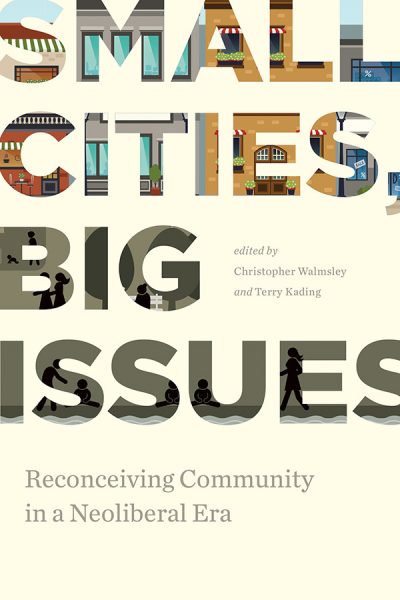Transparent Lives Surveillance in Canada
The New Transparency Project, edited by Colin J. Bennett, Kevin D. Haggerty, David Lyon, and Valerie Steeves

Subjects: Canadian Studies, Political Science, Public Policy, Sociology
Imprint: AU Press
Small Canadian cities confront serious social issues as a result of the neoliberal economic restructuring practiced by both federal and provincial governments since the 1980s. Drastic spending reductions and ongoing restraint in social assistance, income supports, and the provision of affordable housing, combined with the offloading of social responsibilities onto municipalities, has contributed to the generalization of social issues once chiefly associated with Canada’s largest urban centres. As the investigations in this volume illustrate, while some communities responded to these issues with inclusionary and progressive actions others were more exclusionary and reactive—revealing forms of discrimination, exclusion, and “othering” in the implementation of practices and policies. Importantly, however their investigations reveal a broad range of responses to the social issues they face. No matter the process and results of the proposed solutions, what the contributors uncovered were distinctive attributes of the small city as it struggles to confront increasingly complex social issues.
If local governments accept a social agenda as part of its responsibilities, the contributors to Small Cities, Big Issues believe that small cities can succeed in reconceiving community based on the ideals of acceptance, accommodation, and inclusion.
With contributions by Lorry-Ann Austin, Jacques Caillouette, Graham Day, Robert Harding, Wendy Hulko, Paul Jenkinson, Kathie McKinnon, Sharlene Matthew, Jennifer Murphy, Diane Purvey, Mónica J. Sánchez-Flores, and Sydney Weaver
Pulling together an immense amount of material about the governance of small towns, Walmsley and Kading observe the new reality of governing and living in a small city. What they offer is a larger and much longer picture of the effects of neoliberal policy on municipalities in Canada.
Darlene Marzarii, former Municipal Affairs Minister of British Columbia, 1993–96
An interesting, easy to read volume packed with the complex, contemporary issues facing small cities. Crucial amongst these are globalization and ‘othering’ at the theoretical level, but also homelessness, austerity, substance misuse, and prostituion. Each chapter explores a different concern, but the optimistic tenor is evident throughout the book. For Canadians, small cities offer a way of living that is healthy and sustainable, but as Walmsley and Kading show, they need governmental support to develop into vibrant, welcoming, inclusive, socially cohesive multi-cultural and diverse entities.
Lena Dominelli, co-director of the Institute of Hazard, Risk, and Resilience Research, Durham University
As the title of the book implies, municipalities, including smaller ones, are playing an increasingly important role in addressing major social issues such as homelessness and poverty. Municipalities find themselves on the frontlines and are being asked to do more with less. In response, many are developing innovative strategies to deal with these issues and are contributing to a collection of promising practices which need to be shared. This book provides important lessons for municipalities, particularly smaller ones, and case study research which details the inherent opportunities and challenges. While this book highlights the importance of municipal action, it also emphasizes the need for all levels of government to collectively work together if significant and sustained progress is to be made in addressing major social issues.
Jonathan Coté, Mayor of New Westminster
When compared to the scholarship on metropolitan cities, studies of governance in small cities are relatively few in number, making Small Cities, Big Issues an important resource for researchers interested in the effect of neoliberalism on social exclusion and marginlization in small cities.
Ormsby Review
We are all richer for having this book to read. It should be required reading for each and every MP and MLA currently in government.
Spacing Magazine
A unique window into small city issues and politics that will be of interest to practitioners and scholars alike.
Canadian Journal of Urban Research
A critical and timely analysis of the state of small Canadian cities in the neoliberal era.
Great Plains Research
This work is licensed under a Creative Commons License (CC BY-NC-ND 4.0). It may be reproduced for non-commercial purposes, provided that the original author is credited.